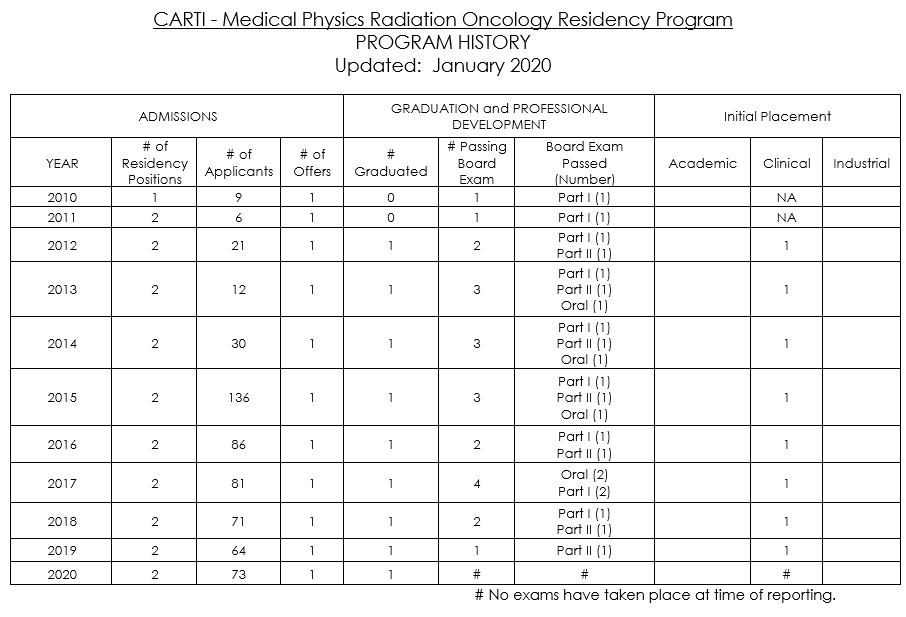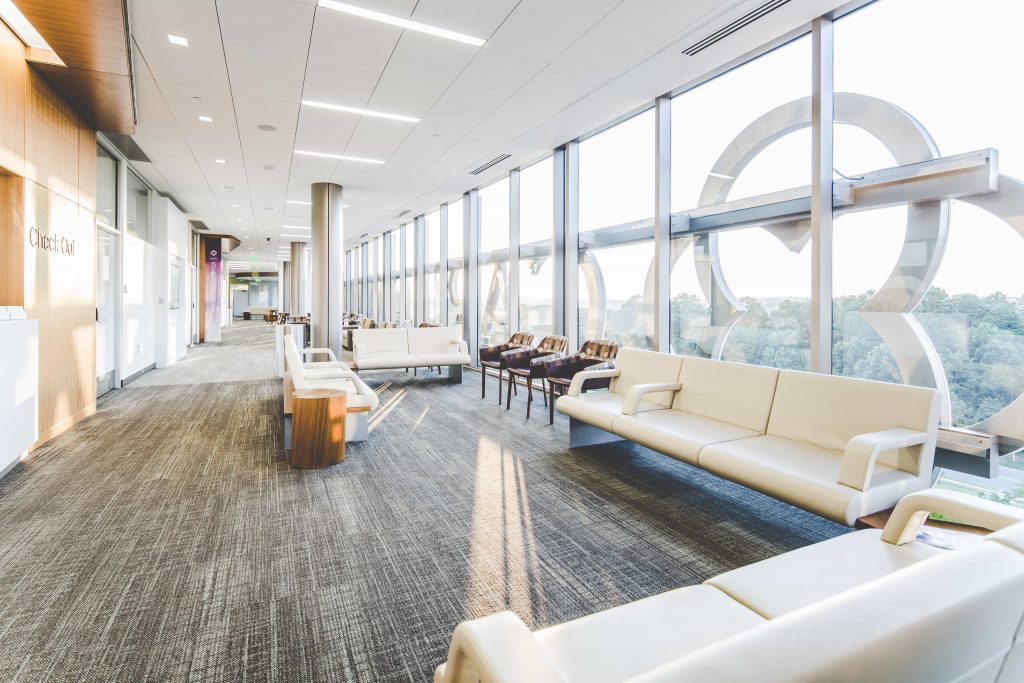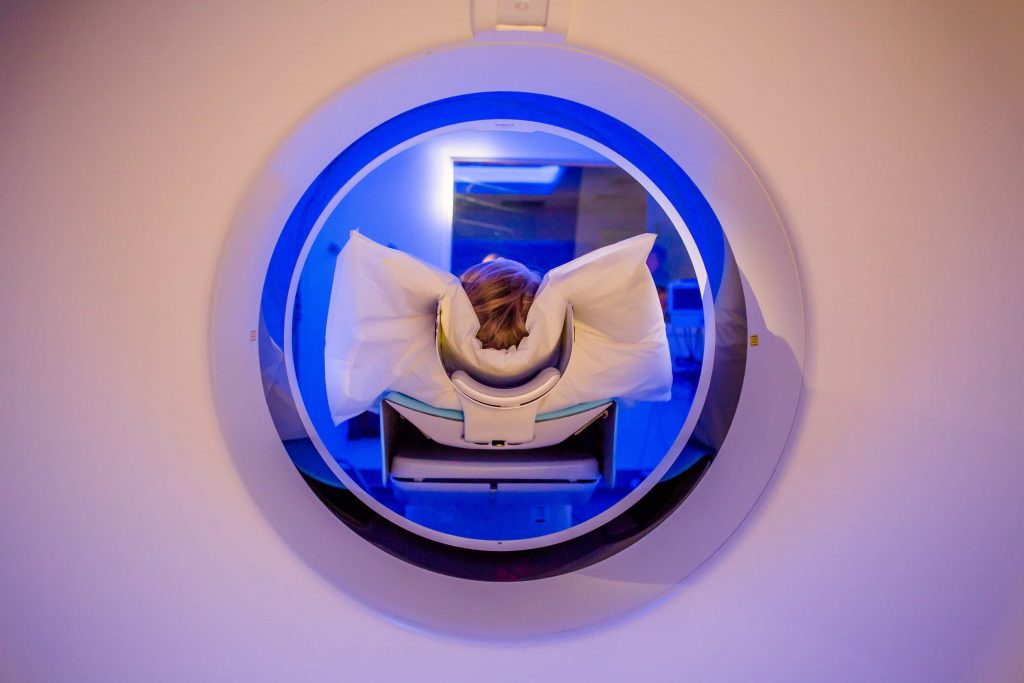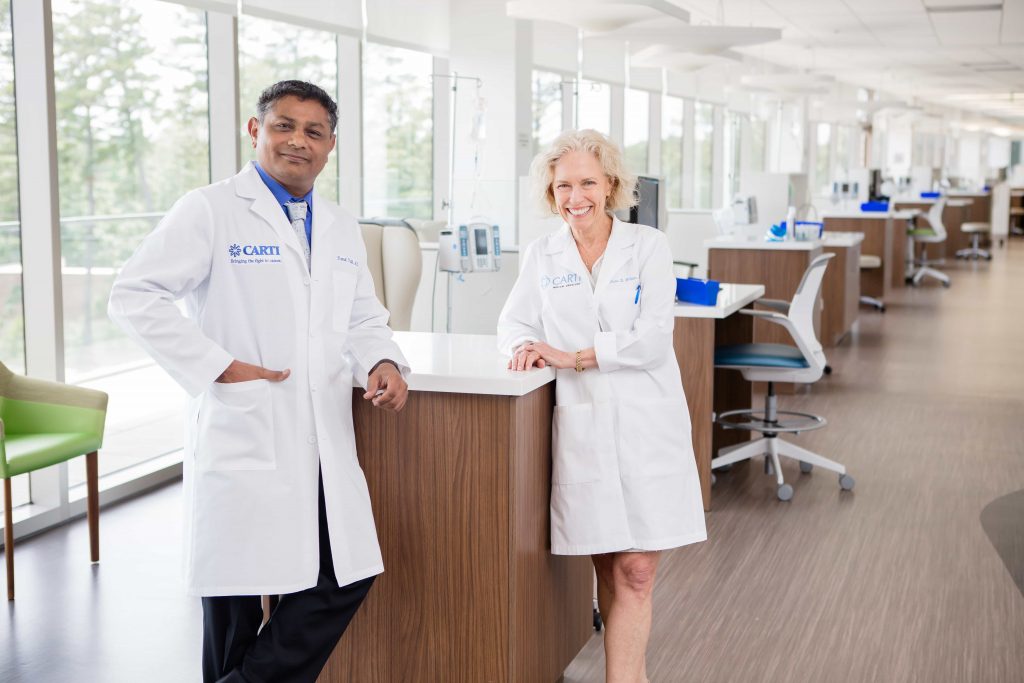We set high standards for cancer care – now and for the future.
That is why CARTI is proud to offer accredited training, including our Radiation Therapy Program and our Medical Physics Residency Program.
RADIATION THERAPY PROGRAM
CARTI offers a one-year educational program to meet the demand for qualified radiation therapists. The program is a continuous resource for well-educated, quality-oriented, professional radiation therapists and is accredited by the Joint Review Committee on Education in Radiologic Technology (JRCERT, www.jrcert.org/). The program has a full eight-year accreditation with the next review date in 2024 and is licensed by the Arkansas Department of Higher Education.
Mission Statement
Our mission is to provide competent and compassionate entry-level radiation therapists to meet the needs of today’s changing health care community in an educational atmosphere of distinction.
A Tradition of Excellence
The performance of the program is demonstrated through program goals, student learning outcomes and program effectiveness data as defined by the Joint Review Committee on Education in Radiologic Technology. Effectiveness data for the programs is available at the following links. This information can also be obtained at www.jrcert.org/resources/program-effectiveness-data.
Goals and Student Learning Outcomes
Admissions/Applications
Students are selected on the basis of their applications, official transcripts, professional references, interviews and within the limits of the program’s student capacity. Please keep in mind that selection for the program is highly competitive. CARTI is unable to select every applicant due to limitations of program capacity and availability of clinical space.
Program Brochure and Admission Requirements
Application for Admission Form
For more information or questions concerning the radiation therapy program, please email the CARTI Education Department at Sheila.Randolph@CARTI.com or call 501.660.7621 or toll free at 1.855.552.2784 ext. 7621.
For questions concerning accreditation of this program, you may contact the JRCERT at the following:
Joint Review Committee on Education in Radiologic Technology
20 North Wacker Drive, Suite 2850
Chicago, IL 60606-3182
Phone: 312.704.5300
Fax: 312.704.5304
www.JRCERT.org
mail@jrcert.org
MEDICAL PHYSICS RESIDENCY PROGRAM
Each year, CARTI offers a Medical Physics Radiation Oncology Residency Program to prepare students entering the field of medical physics. This program is CAMPEP accredited. The 24-month program is strongly clinical and professional, not didactic. CARTI offers the resident a dynamic clinical learning environment with a vigorous and aggressive adoption of new and proven technology.
Admissions
Pre-Requisite Requirements
- Graduate of a CAMPEP-approved medical physics program with a master’s or doctoral degree
- Graduated with at least a 3.0 cumulative overall GPA
- Meets CARTI employee requirements
Application Process
- CARTI is participating in the AAPM Common Application Program and MedPhysMatch. Please see the following website for more information: http://www.aapm.org/CAP/
- The position will be posted by November 1.
Number of Residents
- The physics residency program is designed to handle a maximum of 2 residents. One resident is accepted per year.
New Resident Orientation
Upon entering the program, the resident will be given a residency handbook that covers all resources, opportunities and requirements for successful completion of the CARTI residency program. The program director and all staff physicists will always be available to answer questions and give clarification, should the resident request it. In addition, the resident will be given his/her own CARTI employee manual.
During the two-year residency program, continuing education will be required on a monthly basis. This continuing education is the same as that required of CARTI employees and covers areas such as radiation protection, patient confidentiality, infection control and clinical expectations.
Evaluation of Resident Progress
Residents are monitored throughout the program by the program director. Residents will meet with the program director, as well as the assigned resident mentor, at least once a month. In addition, at the completion of each rotation, the resident will receive written feedback on his/her performance. By the completion of the residency, the physics resident is expected to be able to perform all radiation oncology physics functions.
Financial
The medical physics residency position at CARTI will be a full-time salaried new employee. As such, this position will qualify for the same benefits as any other new employee, including health and dental insurance plans, CARTI holidays, paid time off, 403(b) tax-deferred annuity and retirement plan (the retirement plan is not fully vested for five years). This position also includes paid registration, travel and lodging, and meals to one meeting or workshop each year, as well as membership dues to one related professional society. Transportation to CARTI sites outside of Little Rock is provided by CARTI, or reimbursed at the current mileage level set by CARTI.
All other financial burdens are the responsibility of the resident, including all travel and living expenses, out-of-pocket health care, books, supplies, uniforms/lab coats, etc.
Training Requirements
For Completion
- The requirements for completion of the 24-month residency will be the demonstrated ability to perform independently all tasks generally recognized as fundamental clinical physics duties, as outlined in Task Group 249 of the AAPM.
- The objective of the first year will be the attainment of the ability to manage, with necessary supervision from the CARTI clinical physics staff, the broad range of clinical duties necessary for the daily operation of a radiation oncology clinic; primarily the safe planning and delivery of radiation therapy to cancer patients, state licensing maintenance, radiation safety issues, etc.
- The objective of the second year will be to build on the first year and to develop areas of specialization and expertise, and to develop a greater level of responsibility and independence.
- One advantage that CARTI offers residents is its multiple (6) clinical sites, each staffed with its own radiation oncologist(s), dosimetrist(s), therapists and administrative staff. It is expected that in the second year of the residency, the resident will join the clinical travel rotation with the other staff physicists. This will enhance the resident’s ability to work independently; while at the same time having access to support from the other physics staff.
- It is expected that the resident will attend or participate in departmental and clinical conferences, in-services and e-learning programs which have direct or indirect educational or clinical relevance. Examples of ongoing conferences include weekly physics staff meetings, chart rounds, stereotactic conferences and radiation oncologist case reviews; as well as monthly medical physics journal club and e-learning clinical programs.
Clinical Rotations
Sections
- Introduction to the Treatment Process
- External Beam Treatment Planning and Delivery (non-SRS/SBRT)
- Linacs, Treatment Planning Systems, and Radiation Detection
- Brachytherapy
- SRS/SRT
- SBRT
- Imaging in Radiation Oncology
- Education, Communication, and Research
Evaluation
The method for evaluating the resident’s performance in each clinical rotation will be determined by the CARTI physics staff. Possible methods for evaluation include:
- Oral exams
- Written exams
- Performance of a specific task (e.g. independent performance of annual calibration)
- Oral presentations by the resident to physics or other staff
- Journal article reviews
Program Administration
Role of Program Director
- The program director is Joe Grant, M.S., DABR. The associate program director is Bobby Mathews, M.S., DABR.
- The program director will be responsible for maintaining routine documentation for compliance with CAMPEP certification, directing annual and quarterly reviews of the residency program with the residency advisory board, and conducting monthly reviews with each resident to assess progress through the program.
- The program director will also delegate mentoring responsibilities to the staff physicist on a monthly rotating basis.
Role of Admissions Committee and Review Board
- The following standing committees will meet as needed, but at least annually: the Admissions Committee and the Medical Physics Residency Review Board
- The Admissions Committee will meet starting in December of each year to begin the review process, and to interview new program applicants. It will continue to meet as necessary until an offer has been made and accepted by an applicant.
- The Medical Physics Residency Review Board will review the entire program annually and make changes to the curriculum, rotations and competencies based on feedback from the faculty, residents and other staff. Quarterly reviews will be conducted by the review board to address any pressing matters that may arise.
Admissions Committee Members Include:
- Paul Bruce, M.S., DABR
- Joe Grant, M.S., DABR
- Bobby Mathews, M.S., DABR
- Scott Yakoubian, M.S., DABR
- Vance Keeling, M.S., DABR
- Christopher Pope, M.D.
Equipment and Facilities
The resident will use all CARTI facilities, with occasional travel to satellite centers. Technology available includes:
- Varian TrueBeam and/or C-series linear accelerators equipped with HD or Millenium 120 leaf MLC with integrated imaging systems and/or BrainLab ExacTrac IGRT
- Phillips large bore 4D CT and/or conventional simulator
- Varian Eclipse TPS v13.6
- Phillips Pinnacle3 TPS v9.10
- Mosaiq Record and Verify system
The CARTI Cancer Center also has a Varian TrueBeam accelerator with a 6D table used for cranial stereotactic radiosurgery (SRS), stereotactic radiotherapy (SRT) and stereotactic body radiotherapy (SBRT). TLow dose rate (LDR) prostate implants using I-125 and Pd-103 seeds are performed at the CARTI Cancer Center and Mountain Home at a local, or adjacent hospital. For example, the CARTI Cancer Center implants are performed in the operating room at St. Vincent Infirmary.
In addition, CARTI/Baptist treats high dose rate (HDR) treatments using Nucletron MicroSelectron v3. HDR is primarily used for gynecological applications and Mammosite breast therapy. Brachytherapy planning utilizes Oncentra for HDR and Variseed planning system for LDR seed implants.
Physics equipment available is extensive, and includes two iba Blue Phantom scanning system systems with micro-diamond, diode and ion chamber detectors, an iba linear diode array (LDA), assorted phantoms and phantom materials, cylindrical, parallel-plate and well type ionization chambers of various sizes, electrometers and a MOSFET system for in-vivo measurements.
Additional QA phantoms include a MapCheck2, ArcCheck and Quasar. There is also a Profiler diode array system. Special CT phantoms and a Victoreen Nero mAx radiation output detector are used for CT- simulator QA.
Almost all maintenance and repair of treatment machines is performed in-house, so a well equipped engineering electrical/machine shop – including a milling machine, a lathe and woodworking tools – is available on site.
Educational facilities include conference rooms with video teleconferencing at each site. Office space for the resident’s use is provided. There are at present no formal library facilities within the physics department; however, the department purchases necessary and useful textbooks and reference materials and several online subscriptions to journals which are made readily available to department members, including residents. In addition, extensive personal libraries of the department members are available for sharing. The resident will have ready access to the internet and other electronic resources.
Program History: Past and Current Residents
Name: Jatinder (Jay) Saini, Ph.D.
Graduation: June 2012
Present Status: Senior Medical Physicist, Seattle Cancer Care Alliance Proton Therapy Center Seattle, WA
Certification: ABR (2013)
Name: Bobby Mathews, M.S., DABR
Graduation: July 2013
Present Status: Medical Physicist, CARTI, Little Rock, AR
Certification: ABR (2014)
Name: Stephanie (Maricle) Simpson, M.S., DABR
Graduation: July 2014
Present Status: Medical Physicist, Alyzen Medical Physics Consulting, Jonesboro, AR
Certification: ABR (2015)
Name: Pushpa Otageri, M.S., DABR
Graduation: June 2015
Present Status: Medical Physicist, Augusta Health Center, Fishersville, VA
Certification: ABR (2017)
Name: Daniel McFadden, M.S., DABR
Graduation: July 2016
Present Status: Medical Physicist, Northwest Medical Physics Center, Seattle, WA
Certification: ABR (2017)
Name: Mark Johnson, M.S.
Graduation: July 2017
Present Status: Medical Physicist, Jaeger Corporation, Sioux City, IA
Certification: ABR Board Eligible
Name: David Heins, M.S.
Graduation: July 2018
Present Status: Medical Physics Resident, CARTI
Name: Ben Dapaah-Afriye, M.S.
Graduation: July 2019
Present Status: Medical Physics Resident, CARTI

Contact Joe Grant at JGrant@CARTI.com or Bobby Mathews at BMathews@CARTI.com for more information.



